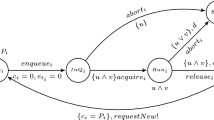Abstract
To engineer reliable real-time systems, it is desirable to detect timing anomalies early in the development process. However, there is little work addressing the problem of accurately predicting timing properties of real-time systems before implementations are developed. This paper describes an approach to the specification and schedulability analysis of real-time systems based on the timed process algebra ACSR-VP, which is an extension of ACSR with value-passing communication and dynamic priorities. Combined with the existing features of ACSR for representing time, synchronization and resource requirements, ACSR-VP is capable of specifying a variety of real-time systems with different scheduling disciplines in a modular fashion. Moreover, we can use VERSA, a toolkit we have developed for ACSR, to perform schedulability analysis on real-time systems specified in ACSR-VP automatically by checking for a certain bisimulation relation.
Similar content being viewed by others
References
Brémond-Grégoire, P. Aprocess Algebra of Communicating Shared Resources with Dense Time and Priorities. PhD thesis, Department of Computer and Information Science, The University of Pennsylvania, Philadelphia, PA 19104, 1994. Tech. Report MS-CIS–94–24.
Brémond-Grégoire, P., Choi, J.-Y., and Lee, I. A Complete Axiomatization of Finite-state ACSR Processes. Information and Computation, No 138, 1997.
Burns, A. Preemptive priority-based scheduling: An appropriate engineering approach. In Sang H. Song, editor, Advances in Real-Time Systems, chapter 10, pages 225–248. Prentice Hall, 1995.
Burns, A. and Wellings, A. Priority Inheritance and Message Passing Communication: A Formal Treatment. Real-Time Systems: The Interanational Journal of Time Critical Computing Systems, 3(1):19–44, 1991.
Chen, M. and Lin, K. Dynamic Priority Ceilings: A Concurrency Control Protocol for Real-Time Systems. Real-Time Systems: The Interanational Journal of Time Critical Computing Systems, 2(4):325–346, 1990.
Clarke, D., Lee, I.,, and Xie, H. VERSA: A Tool for the Specification and Analysis of Resource-Bound Real-Time Systems. Journal of Computer and Software Engineering, 3(2):189–215, April 1995.
Cleaveland, R., Parrow, J., and Steffen, B. A Semantics-Based Verification Tool for Finite-State Systems. In Proc. of Protocol Specification, Testing, and Verification, IX, pages 287–302. Elsevier Science Publishers B.V., 1990.
Cleaveland, R. and Yankelevich, D. An Operational Framework for Value-Passing Processes. In Proc. of Principles of Programming, Portand, Oregon, January 1994.
Corbett, J. Modeling and Analysis of Real-Time Ada Tasking programs. In Proc. of IEEE Real-Time Systems Symposium, pages 132–141, 1994.
Fredette, A. and Cleaveland, R. RTSL: A Language for Real-Time Schedulability Analysis. In Proc. of IEEE Real-Time Systems Symposium, pages 274–283, 1993.
Gerber, R. Communicating Shared Resources: A Model for Distributed Real-Time Systems. PhD thesis, Department of Computer and Information Science, University of Pennsylvania, 1991.
Gerber, R. and Lee, I. A Layered Approach to Automating the Verification of Real-Time Systems. IEEE Trans. on Software Eng., 18(9):768–784, 1992.
Hennessy, M. A Proof System for Communicating Processes with Value-passing. Formal Aspects of Computing, 3:346–366, 1991.
Hennessy, M. and Lin, H. Symbolic Bisimulation. Technical report, Computer Science, School of Cognitive and Computing Sciences, University of Sussex, Brighton, UK, April 1992.
Hennessy, M. and Lin, H. Proof Systems for Message-passing Process Algebras. In CONCUR 93, pages 202–216. LNCS 715, Springer Verlag, 1993.
Janowski, T. and Joseph, M. Dynamic Scheduling in the Presence of Faults: Specification and Verification. Technical Report RR301, Department of Computer Science, University of Warwick, 1996.
Joseph, M. and Pandya, P. Finding Response Times in a Real-Time System. Computer Journal, 29(5):390–395, 1986.
Kanellakis, P. and Smolka, S. CCS Expressions, Finite State Processes, and Three Problems of Equivalence. Information and Computation, 86:43–68, 1990.
Lauber, R. Forecasting Real-Time Behavior During Software Design using a CASE Environment. Real-Time Systems: The Interanational Journal of Time Critical Computing Systems, 1(1):61–76, 1989.
Lee, I., Brémond-Grégoire, P., and Gerber, R. A Process Algebraic Approach to the Specification and Analysis of Resource-Bound Real-Time Systems. Proceedings of the IEEE, 82(1):158–171, 1994.
Lee, I., Clarke, D., and Xie, H. The algebra of communicating shared resources and its toolkit. In Sang H. Song, editor, Advances in Real-Time Systems, chapter 12, pages 275–298. Prentice Hall, 1995.
Lee, I. and Gehlot, V. Language Constructs for Distributed Real-Time Programming. In Proc. IEEE Real-Time Systems Symposium, 1985.
Liu, C. and Layland, J. Scheduling algorithms for multi-programming in a hard-real-time environment. Journal of the ACM, 20:46–61, 1973.
Liu, J. and Ha, R. Efficient methods of validating timing constraints. In Sang H. Song, editor, Advances in Real-Time Systems, chapter 9, pages 199–233. Prentice Hall, 1995.
Milner, R. Communication and Concurrency. Prentice-Hall, 1989.
Mok, A. The Design of Real-Time Programming Systems Based on Process Models. In Proc. of IEEE Real-Time Systems Symposium, pages 5–17, 1984.
Molini, J., Maimon, S., and Watson, P. Real-Time System Scenarios. In Proc. of IEEE Real-Time Systems Symposium, pages 214–225, 1990.
Park, D. Concurrency and Automata on Infinite Sequences. In Proc. of 5th GI Conference. LNCS 104, Springer Verlag, 1981.
Pilling, M., Burns, A., and Raymond, K. Formal Specification and Proofs of Inheritance Protocols for Real-time Scheduling. Software Engineering Journal, 5(5):263–279, 1990.
Rajkumar, R., Sha, L., and Lehoczky, J. Real-Time Synchronization Protocols for Multiprocessors. In Proc. of IEEE Real-Time Systems Symposium, pages 259–272, 1989.
Schreiber, M. Value-passing Process Calculi as a Formal Method. PhD thesis, Department of Computing, Imperial College, University of London, 1994.
Sha, L., Rajkumar, R., and Lehoczky, J. Priority Inheritance Protocols: An Approach to Real-Time Synchronization. IEEE Transactions on Computers, 39(9):1175–1185, 1990.
Sha, L., Rajkumar, R., Lehoczky, J., and Ramamritham, J. Mode change Protocols for Priority Driven Preemptive Scheduling. Real-Time Systems: The Interanational Journal of Time Critical Computing Systems, 1(3), December 1989.
Sprunt, B., Sha, L., and Lehoczky, J. Aperiodic Task Scheduling for Hard-Real-Time Systems. Real-Time Systems: The Interanational Journal of Time Critical Computing Systems, 1(1):27–60, 1989.
Thomsen, B. and Ingólfsdóttir, A. Semantic Models for CCS with Values. In Proc. of Chalmers Workshop in Concurrency, May 1991.
Author information
Authors and Affiliations
Rights and permissions
About this article
Cite this article
Ben-Abdallah, H., Choi, JY., Clarke, D. et al. A Process Algebraic Approach to the Schedulability Analysis of Real-Time Systems. Real-Time Systems 15, 189–219 (1998). https://doi.org/10.1023/A:1008047130023
Issue Date:
DOI: https://doi.org/10.1023/A:1008047130023




